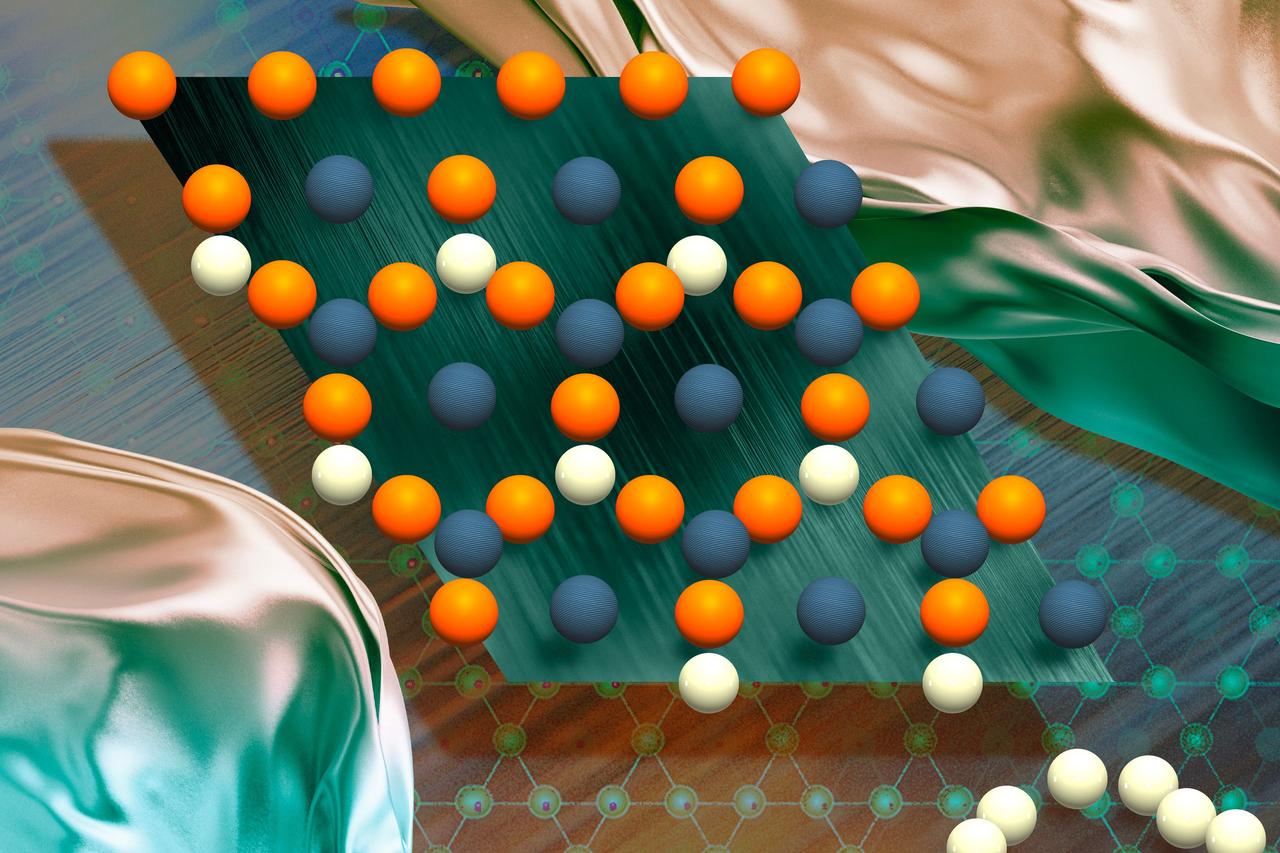AI Breakthrough: Predicting Material Properties Without Costly Quantum Calculations
2 Sources
2 Sources
[1]
AI predicts material properties using electron-level information without costly quantum mechanical computations
Researchers in Korea have developed an artificial intelligence (AI) technology that predicts molecular properties by learning electron-level information without requiring costly quantum mechanical calculations. The research was presented at ICLR 2025. A joint research team led by Senior Researcher Gyoung S. Na from the Korea Research Institute of Chemical Technology (KRICT) and Professor Chanyoung Park from the Korea Advanced Institute of Science and Technology (KAIST) has developed a novel AI method -- called DELID (Decomposition-supervised Electron-Level Information Diffusion) -- that accurately predicts material properties using electron-level information without performing quantum mechanical computations. The method achieved state-of-the-art prediction accuracy on real-world datasets consisting of approximately 30,000 experimental molecular data. Traditional computational science and AI methods have been limited in utilizing electron-level information -- essential for determining molecular properties -- due to the excessive cost of quantum mechanical calculations. As a result, most existing AI models rely solely on atom-level molecular descriptors, leading to limitations in prediction accuracy, particularly for complex molecules. To address this challenge, the research team devised DELID, a generative AI method that infers the electron-level features of complex molecules by combining information from simpler molecular fragments. DELID decomposes complex molecules into chemically valid substructures, retrieves electron-level properties of these fragments from quantum chemistry databases, and uses a self-supervised diffusion model to infer the overall electronic structure. This enables accurate property prediction without the need for large-scale quantum mechanical simulations. Uniquely, DELID allows molecular property prediction using electron-level information without actually performing quantum computations on the target molecule. This represents a significant leap forward, enabling electron-aware predictions without requiring quantum computers. In benchmark tests on over 30,000 experimentally measured molecular property datasets -- including physical, toxicological, and optical properties -- DELID achieved the highest accuracy among state-of-the-art models. In particular, for optical property prediction tasks such as CH-DC and CH-AC, which are relevant to OLED and solar cell material design, existing models typically show low prediction accuracy (31-44%). DELID achieved an accuracy of 88%, more than twice the performance of top existing AI models. Senior Researcher Na commented, "DELID enables accurate prediction of molecular properties by incorporating electron-level information without the burden of high computational cost, overcoming a major limitation of conventional AI approaches." KRICT President Dr. Youngkuk Lee added, "We expect DELID to make significant contributions to practical AI applications in chemical industries such as drug discovery, toxicity assessment, and optoelectronic materials development."
[2]
AI Estimates Electron-Level Information for Molecular Property Prediction Without High-Cost Quantum Mechanical Calculations | Newswise
Newswise -- Researchers in Korea have developed an artificial intelligence (AI) technology that predicts molecular properties by learning electron-level information without requiring costly quantum mechanical calculations. A joint research team led by Senior Researcher Gyoung S. Na from the Korea Research Institute of Chemical Technology (KRICT) and Professor Chanyoung Park from the Korea Advanced Institute of Science and Technology (KAIST) has developed a novel AI method -- called DELID (Decomposition-supervised Electron-Level Information Diffusion) -- that accurately predicts material properties using electron-level information without performing quantum mechanical computations. The method achieved state-of-the-art prediction accuracy on real-world datasets consisting of approximately 30,000 experimental molecular data. Traditional computational science and AI methods have been limited in utilizing electron-level information -- essential for determining molecular properties -- due to the excessive cost of quantum mechanical calculations. As a result, most existing AI models rely solely on atom-level molecular descriptors, leading to limitations in prediction accuracy, particularly for complex molecules. To address this challenge, the research team devised DELID, a generative AI method that infers the electron-level features of complex molecules by combining information from simpler molecular fragments. DELID decomposes complex molecules into chemically valid substructures, retrieves electron-level properties of these fragments from quantum chemistry databases, and uses a self-supervised diffusion model to infer the overall electronic structure. This enables accurate property prediction without the need for large-scale quantum mechanical simulations. Uniquely, DELID allows molecular property prediction using electron-level information without actually performing quantum computations on the target molecule. This represents a significant leap forward, enabling electron-aware predictions without requiring quantum computers. In benchmark tests on over 30,000 experimentally measured molecular property datasets -- including physical, toxicological, and optical properties -- DELID achieved the highest accuracy among state-of-the-art models. In particular, for optical property prediction tasks such as CH-DC and CH-AC, which are relevant to OLED and solar cell material design, existing models typically show low prediction accuracy (31-44%). DELID achieved an accuracy of 88%, more than twice the performance of top existing AI models. Senior Researcher Na commented, "DELID enables accurate prediction of molecular properties by incorporating electron-level information without the burden of high computational cost, overcoming a major limitation of conventional AI approaches." KRICT President Dr. Youngkuk Lee added, "We expect DELID to make significant contributions to practical AI applications in chemical industries such as drug discovery, toxicity assessment, and optoelectronic materials development." This research was presented at ICLR 2025, one of the top-tier AI conferences. KRICT is a non-profit research institute funded by the Korean government. Since its foundation in 1976, KRICT has played a leading role in advancing national chemical technologies in the fields of chemistry, material science, environmental science, and chemical engineering. Now, KRICT is moving forward to become a globally leading research institute tackling the most challenging issues in the field of Chemistry and Engineering and will continue to fulfill its role in developing chemical technologies that benefit the entire world and contribute to maintaining a healthy planet. More detailed information on KRICT can be found at https://www.krict.re.kr/eng/ The study was was supported by the Ministry of Trade, Industry and Energy (TS241-10R), the National Research Foundation of Korea, and the Ministry of Science and ICT (NRF-2022M3J6A1063021, RS-2024-00406985).
Share
Share
Copy Link
Korean researchers develop DELID, an AI method that accurately predicts molecular properties using electron-level information without performing expensive quantum mechanical computations, potentially revolutionizing fields like drug discovery and materials science.
Breakthrough in AI-Driven Material Property Prediction
Researchers from the Korea Research Institute of Chemical Technology (KRICT) and the Korea Advanced Institute of Science and Technology (KAIST) have developed a groundbreaking artificial intelligence (AI) method that accurately predicts molecular properties without the need for costly quantum mechanical calculations. This innovative approach, named DELID (Decomposition-supervised Electron-Level Information Diffusion), was presented at ICLR 2025, a top-tier AI conference
1
2
.The Challenge of Electron-Level Information
Traditionally, computational science and AI methods have struggled to utilize electron-level information, which is crucial for determining molecular properties, due to the prohibitive cost of quantum mechanical calculations. Most existing AI models rely solely on atom-level molecular descriptors, leading to limitations in prediction accuracy, especially for complex molecules
1
.DELID: A Novel Approach to Molecular Property Prediction

Source: Phys.org
To address this challenge, the research team devised DELID, a generative AI method that infers the electron-level features of complex molecules by combining information from simpler molecular fragments. The process involves three key steps:
- Decomposing complex molecules into chemically valid substructures
- Retrieving electron-level properties of these fragments from quantum chemistry databases
- Using a self-supervised diffusion model to infer the overall electronic structure
This approach enables accurate property prediction without the need for large-scale quantum mechanical simulations, representing a significant leap forward in the field
1
2
.Impressive Performance in Benchmark Tests
DELID has demonstrated remarkable accuracy in benchmark tests on over 30,000 experimentally measured molecular property datasets, including physical, toxicological, and optical properties. The method achieved the highest accuracy among state-of-the-art models
1
.Particularly noteworthy is DELID's performance in optical property prediction tasks such as CH-DC and CH-AC, which are relevant to OLED and solar cell material design. While existing models typically show low prediction accuracy (31-44%) for these tasks, DELID achieved an impressive 88% accuracy, more than doubling the performance of top existing AI models
1
2
.Related Stories
Implications for Chemical Industries and Research
Senior Researcher Gyoung S. Na from KRICT emphasized the significance of DELID, stating, "DELID enables accurate prediction of molecular properties by incorporating electron-level information without the burden of high computational cost, overcoming a major limitation of conventional AI approaches"
1
.KRICT President Dr. Youngkuk Lee expressed optimism about the potential applications of this technology, saying, "We expect DELID to make significant contributions to practical AI applications in chemical industries such as drug discovery, toxicity assessment, and optoelectronic materials development"
2
.Future Prospects and Support
The development of DELID opens up new possibilities for accelerating research and innovation in various fields of chemistry and materials science. By providing accurate predictions without the need for expensive quantum computations, this technology could significantly reduce the time and cost associated with developing new materials and compounds
1
2
.The study was supported by the Ministry of Trade, Industry and Energy, the National Research Foundation of Korea, and the Ministry of Science and ICT, highlighting the importance of this research in advancing national technological capabilities
2
.As AI continues to revolutionize scientific research and industrial applications, breakthroughs like DELID demonstrate the potential for machine learning to overcome long-standing challenges in computational chemistry and materials science, paving the way for faster and more efficient discovery processes in critical areas such as drug development and renewable energy technologies.
References
Summarized by
Navi
Related Stories
AI Breakthrough: Million Times Faster Optical Property Predictions for Advanced Materials
09 Oct 2024•Science and Research

AI in Chemistry breakthrough: Two systems accelerate molecule design and drug discovery by 10x
29 Jan 2026•Science and Research

AI Revolutionizes Drug Discovery: KAIST's BInD Model Designs Optimal Cancer-Fighting Molecules
12 Aug 2025•Science and Research

Recent Highlights
1
ByteDance's Seedance 2.0 AI video generator triggers copyright infringement battle with Hollywood
Policy and Regulation

2
Demis Hassabis predicts AGI in 5-8 years, sees new golden era transforming medicine and science
Technology

3
Nvidia and Meta forge massive chip deal as computing power demands reshape AI infrastructure
Technology





